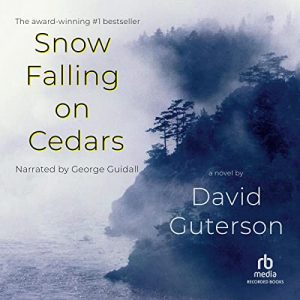Snow Falling on Cedars Audiobook: A Symphony of Snow, Secrets, and Silence
It was one of those quiet evenings when the world outside my window mirrored the cover of David Guterson’s Snow Falling on Cedars Audiobook. Snowflakes danced in the glow of streetlights, a muted hush blanketing everything. As I pressed play on George Guidall’s narration, I found myself swept into a storm – not just of snow, but of human frailty, love, and prejudice. What started as a seemingly straightforward courtroom drama soon unraveled into a haunting exploration of memory, identity, and the scars left by war.
Guterson’s prose, brought to life through Guidall’s steady voice, is like stepping into a painting – each stroke deliberate, each detail vivid. The story opens with the trial of Kabuo Miyamoto, a Japanese-American fisherman accused of murdering Carl Heine in the 1950s on an isolated island in Puget Sound. Yet this is no mere legal thriller. Instead, it is an intricate mosaic of flashbacks and personal histories that reveal the fractures within this small community. The snow-covered landscape becomes both setting and metaphor – a beautiful yet suffocating presence that hides as much as it reveals.
Guidall’s narration elevates this audiobook into an almost meditative experience. His voice carries the weight of Guterson’s lyrical descriptions while navigating the shifting perspectives with precision. Each character – from Ishmael Chambers, the embittered war veteran turned local reporter, to Hatsue Imada, Kabuo’s wife and Ishmael’s former lover – is rendered with such care that they feel like echoes from another time. Guidall doesn’t merely read; he inhabits these voices, imbuing them with layers of emotion that linger long after each chapter ends.
What struck me most about Snow Falling on Cedars Audiobook was its refusal to be boxed into a single genre or tone. Yes, there’s a mystery at its core: Did Kabuo commit murder? But calling it a mystery novel feels reductive. This is a story about moral ambiguity and how history – both personal and collective – shapes us in ways we can’t always control. Through flashbacks to World War II and its aftermath, Guterson delves into themes of racism and injustice without ever resorting to didacticism. The internment of Japanese-Americans looms large over the narrative like an unspoken wound that everyone knows but no one wants to acknowledge.
The romance between Ishmael and Hatsue is another thread that adds depth to this already rich tapestry. Their love is tender yet doomed – a bittersweet reminder of how societal expectations can stifle even the purest emotions. I found myself holding my breath during scenes where they meet secretly beneath cedar trees or exchange letters filled with longing and confusion. It’s rare for an audiobook to make you feel like you’re intruding on someone’s private thoughts, but Guidall achieves just that.
One moment that particularly stayed with me was Ishmael standing alone in his newspaper office during a snowstorm, grappling with whether to reveal evidence that could exonerate Kabuo. The scene is laden with tension – not because of any dramatic action but because it captures the quiet agony of moral decision-making. As someone who has faced crossroads in my own life (albeit far less dramatic), I couldn’t help but empathize with Ishmael’s internal struggle.
Guterson also excels at capturing the Pacific Northwest itself – its rugged beauty juxtaposed against its insular culture. Having spent some time in Washington State myself, I could almost smell the salt air and hear the creak of fishing boats rocking against their moorings. This sense of place isn’t just background; it’s integral to understanding why these characters act as they do.
If I have one critique – and it’s a minor one – it would be that some passages felt overly descriptive at times. While I appreciated Guterson’s attention to detail, there were moments when I wished he’d let certain scenes breathe without layering them in metaphors or historical context. That said, this meticulousness also adds to the novel’s immersive quality.
As the final chapter unfolded and Guidall’s voice faded into silence, I sat there reflecting on what Snow Falling on Cedars Audiobook had given me: not just a story but an experience – a window into lives shaped by love and loss amidst forces larger than themselves. It reminded me that history isn’t something abstract; it lives within us all, shaping our choices and our relationships.
For those who haven’t yet ventured into this snow-laden world Guterson has created, you’re in for something special. And here’s some good news: You can freely download Snow Falling on Cedars Audiobook at Audiobooks4soul.com – a gift for anyone seeking literature that lingers long after you’ve closed your eyes or turned off your headphones.
Until our next literary journey together – whether through galaxies far away or small towns steeped in secrets – happy listening!
Warm regards,
Stephen











